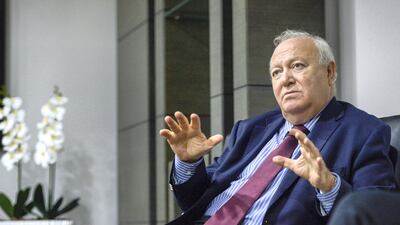The Middle East and Europe must form a stronger alliance to tackle the Arab world’s numerous crises, Spain’s former minister of foreign affairs said in Abu Dhabi on Thursday.
“You cannot understand Europe without the Middle East and vice versa,” Miguel Moratinos told students during a lecture at the Emirates Diplomatic Academy.
"We're part of the same region. We haven't been a real actor in solving the Syrian crisis or others in the region but we are paradoxically suffering the consequences of this crisis — who is receiving the hundreds of thousands of refugees from the Middle East? Who is mainly suffering from the terrorist attacks?"
He spoke of the "undiplomatic" decision by US President Donald Trump in moving the country's embassy to Jerusalem and naming it the capital of Israel, causing more instability in the region.
"It's illegal and distracts from the main issue at hand," he said. "Jerusalem is a global city which belongs to the whole world and the three religions. Instead of a clash of civilisations, it should be the symbol of alliance for them and to provoke in an unnecessary manner with this move isn't moving in the right direction and it can degenerate in a very dangerous [way]."
Speaking to The National, Mr Moratinos said people in the region were still suffering from a lack of peace.
“You have to be extremely careful with diplomacy in foreign affairs when you take decisions,” he said. “You have to be more consistent when you are playing with the future of people. This decision was a mistake and the only positive thing is it might make the Arab side unified [with] the Europeans to work together to find a way for a final settlement between Israel and Palestine.”
_______________
Read more:
The UAE’s new man in Paris: two countries united by activist leadership
Diplomacy students learn about the UAE's foreign policy
_______________
He said it marked an opportunity for Europe and the Middle East to work together in a different manner. "We cannot go business as usual," he said. "The situation demands an urgent new approach to the Middle East and the time has come to adopt this new policy because the whole situation is extremely risky and dangerous. The strong ties between us will improve today if we confront the challenge together."
The former EU envoy to the Middle East said there were high hopes with the new French president and the new EU it is trying to formulate.
"We will be able to engage in a much intense relationship with this area.
"I hope the future months will demonstrate that Europeans are back in a positive manner with Arab friends to construct together a certain kind of partnership and find a better future for the region."
The UAE's troubled surroundings are a major cause for concern, he said.
“Arabs are our brothers but every time Europeans want to play a real role in the negotiation process with Palestinians, they say 'better not, let’s go to the US that is an honest broker',” he said.
"We need now to move in the diplomatic arena and tell the Americans our plan. [The UAE] cannot be isolated — if the situation around you isn't stable, you have to share the commitment and responsibility to improve the whole situation."
He also spoke to students about the changing role of diplomats in a world of social media and instant media reporting.
"The world we are living in is global, complex and uncertain, and diplomats are in a better place to understand interconnections between countries and people," Mr Moratinos said. "You have to understand the interrelation between this complex reality, in economics, technology or culture. Those who understand can make a comprehensive analysis and forecast for the future and diplomats can prevent conflicts, which is needed."
Social media has played a crucial role in politics and security in recent times with leaders taking to Twitter to make announcements and terrorist groups such as Isil using the internet to recruit. But it will not replace diplomacy, Mr Moratinos said.
"It's a reality of today that you have to live with. There is great enthusiasm for it but it doesn't change the fact that it is not the only reality. It can help on final policies but diplomacy makes the final engagement and new diplomats of the 21st century have to be convinced of their mission, capacities and committed to perform and fulfil their task."

